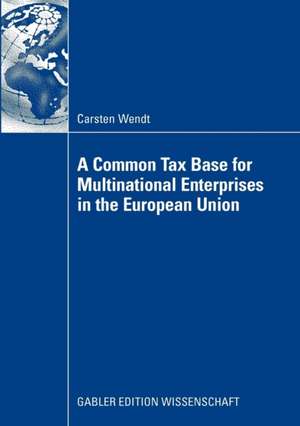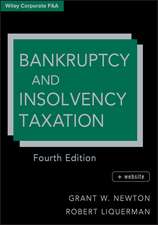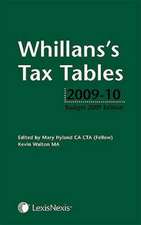A Common Tax Base for Multinational Enterprises in the European Union
Autor Carsten Wendten Limba Engleză Paperback – 17 feb 2009
Preț: 383.50 lei
Nou
Puncte Express: 575
Preț estimativ în valută:
73.39€ • 75.16$ • 61.05£
73.39€ • 75.16$ • 61.05£
Carte tipărită la comandă
Livrare economică 18 martie-01 aprilie
Preluare comenzi: 021 569.72.76
Specificații
ISBN-13: 9783834913265
ISBN-10: 383491326X
Pagini: 231
Ilustrații: XVII, 231 p. 9 illus.
Dimensiuni: 148 x 210 x 13 mm
Greutate: 0.31 kg
Ediția:2009
Editura: Gabler Verlag
Colecția Gabler Verlag
Locul publicării:Wiesbaden, Germany
ISBN-10: 383491326X
Pagini: 231
Ilustrații: XVII, 231 p. 9 illus.
Dimensiuni: 148 x 210 x 13 mm
Greutate: 0.31 kg
Ediția:2009
Editura: Gabler Verlag
Colecția Gabler Verlag
Locul publicării:Wiesbaden, Germany
Public țintă
ResearchCuprins
Theory of Multinational Enterprises.- Guidelines for Income Taxation of Multinational Enterprises.- Company Taxation in the European Union – a Stocktaking.- An Evaluation of the Prevailing Corporation Tax in the European Union.- A Common Tax Base for Multinational Enterprises in the European Union.- Conclusions.
Notă biografică
Dr. Carsten Wendt promovierte bei Prof. Dr. Christoph Spengel am Lehrstuhl für Allgemeine Betriebswirtschaftslehre und Betriebswirtschaftliche Steuerlehre II der Universität Mannheim. Er ist Assistent des Finanzvorstands der HeidelbergCement AG in Heidelberg.
Textul de pe ultima copertă
Company taxation is an important element for the establishment and the completion of the Internal Market. Against this background, the European Commission recommends the harmonisation of the tax base in the European Union.
Carsten Wendt analyses the necessity, the concept as well as potential advantages and effects of a common tax base for multinational enterprises in the European Union. He addresses important issues concerning a common tax base, such as the definition of the consolidated group, the technique and scope of consolidation and the formula used to allocate the consolidated tax base among the involved member states. The author provides alternative options to solve these issues and concludes that a common tax base as intended by the European Commission would remedy many of the existing tax obstacles for multinational enterprises in the EU. However, distortions will remain, mainly because member states retain their sovereignty to set their tax rates independently and the territorial scope of a common tax base has to be restricted to group entities located within the EU.
Carsten Wendt analyses the necessity, the concept as well as potential advantages and effects of a common tax base for multinational enterprises in the European Union. He addresses important issues concerning a common tax base, such as the definition of the consolidated group, the technique and scope of consolidation and the formula used to allocate the consolidated tax base among the involved member states. The author provides alternative options to solve these issues and concludes that a common tax base as intended by the European Commission would remedy many of the existing tax obstacles for multinational enterprises in the EU. However, distortions will remain, mainly because member states retain their sovereignty to set their tax rates independently and the territorial scope of a common tax base has to be restricted to group entities located within the EU.










